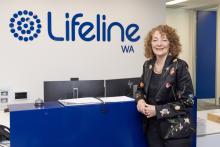The WA Government has an action plan to increase representation of people with disability employed in the public sector – a welcomed initiative to improve economic and social participation.


The WA Government has an action plan to increase representation of people with disability employed in the public sector to 5 per cent by the end of 2025 - a welcomed initiative to improve economic and social participation and support inclusive work environments.
However, the target is ambitious considering the representation of people with disability employed in the public sector - the state’s largest employer with around 166,000 employees across 119 agencies - has remained flat at 1.6 per cent for several years since 2020.
Disability impacts more than 400,000 people in Western Australia, or one in five people across the state, and one in three households. There are around 100,000 Western Australians with disability of working age not in employment.
Good Sammy Enterprises CEO Kane Blackman and Activ Foundation CEO Michael Heath both agree that it’s important to create more opportunities for people living with disability.
“As the state’s largest employer, it is important for the public sector to show leadership around the employment of persons with disability. We welcome the commitment to a target of 5 per cent which will be an improvement on the current 1.6 per cent reported,” Mr Heath said.
“However, with one in five Western Australians identifying as having a disability, we would like to see continued ambition from all employers to ensure their workplaces more accurately reflect the diversity seen within our communities.
“Clearly all employers have more to do to help improve the unemployment rates among persons with a disability. We welcome the state government’s commitment to a 5 per cent target by 2025, however there is still more to be done before our workplaces are truly representative of the diversity within our communities.”
Most companies have a rate of less than 5 per cent representation of people with disability in their workforce and Good Sammy’s CEO said this falls too short. “The unemployment rate for people with disability is more than double that for people without disability,” Mr Blackman said.
A person with disability is facing 10 per cent unemployment in WA, and a person with intellectual disability is facing 20 per cent unemployment, compared to the 3.7 per cent unemployment rate in WA.
“I appreciate there has never been a better time to find employment in this state for some, unless you are a person with disability as this cohort is not seeing the same economic participation uplift as the whole population,” Mr Blackman said.
“For businesses, this is no longer a HR improvement initiative. It is their social licence to operate to ensure their organisation better represents the customers they serve and the communities they operate within.”

Mark Lenane at Good Sammy Enterprise’s Containers for Change recycling social enterprise.
Good Sammy is a leading disability employer with more than 50 per cent of its 830 staff identifying as having a disability. The not-for-profit and social enterprise has a core mission to provide employment opportunities for people with disability. In addition to employing people living with disability, any items purchased from Good Sammy’s 27 stores directly contributes to creating employment outcomes for people with disability.
"Once you improve the visibility of disability, more people understand some of the barriers and access considerations, so the cultural heavy lifting doesn’t have to be done by people with disability themselves or their parents and carers,” Mr Blackman said.
“We would also encourage employers to think laterally; they can deliver employment outcomes by buying services from organisations like Good Sammy that are delivered by people with disability. This is another alternative to direct employment.”
Inclusion of people with disability can help corporates in their ESG goals and further adds to workplace culture by creating a more diverse workplace.
“We live in an increasingly socially conscious world, and by demonstrating active commitment to disability inclusion a business sends a strong message of reliability and dedication to stakeholders, customers and the wider public.
“Establishing a reputation for ethical practises can widely reinforce goodwill and support as well as attract and retain dedicated employees who choose their workplaces mindfully,” Mr Heath said.
“Just like any other employee, people living with disability bring a range of benefits to the workforce. Inviting the diversity of thought, perspective and work style employees with disability bring to a workplace, can provide far-reaching benefits to businesses.
“Aside from improved employee engagement and morale and enhanced customer relations people with disability can be essential for workplace innovation, which positively impacts the bottom line."

Activ Foundation's CEO Michael Heath.
Companies can do more to make it more accessible for people with disability to enter employment and stay there longer.
“Asking someone to disclose a disability during the recruitment process can often feel daunting to applicants. A better approach could be to encourage disclosure at other times during a person’s employment where mutual trust and confidence has already been established,” Mr Heath said.
“Above all, a workplace must feel inclusive and safe for persons with a disability. Increased visibility of current employees who live with disability, for example including these employees in active recruitment panels, can help applicants feel less vulnerable about the new environment they’re in.”
Employing people with disability may require providing flexible working arrangements, including flexible start and finish times, working from home, working part-time, working in different locations, or offering additional support in the workplace.
“Since accessibility is such a broad spectrum, we encourage businesses to actively engage individuals with lived experience when looking to identify where employment and retention of people with disability can be improved. Common approaches can include increased leadership representation, use of inclusive language, and ensuring applicants have equitable opportunities to demonstrate their skills,” Mr Heath said.
“Activ Foundation regularly works with companies to provide extra support to people living with disability in the workplace, and regularly run diversity and inclusion workshops to offer insight on inclusivity and accessibility.”
There are several pathways the corporate sector can engage with disability employment, such as through Good Sammy Enterprise's corporate volunteering and partnership pathways and Activ Foundation’s Activ Pathways.












